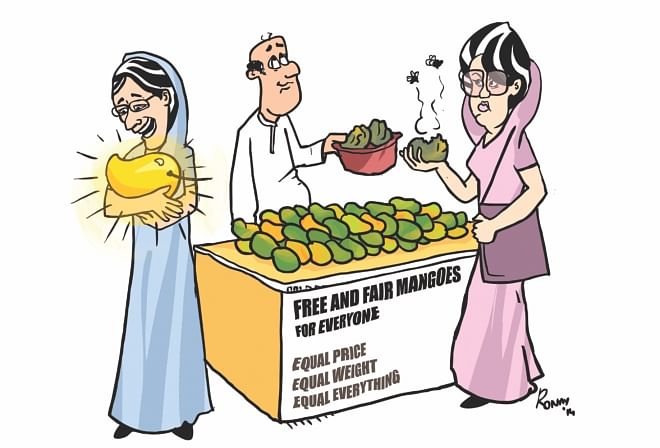A few conceptual notes
A few conceptual notes

The budget of 2014-15 has been a big surprise to many quarters, including the World Bank and the IMF, who thought that Bangladesh would plunge into a poor growth puddle due to political turmoil. If any foreigner had stayed in Dhaka in October to December of 2013, he would have seen how political parties repressed citizens' basic rights.
The Bangladesh economy proved its resilience once again. Achieving 6% growth along with 7% inflation is no mean feat when India is floundering in 5% growth. Pakistan's case is even worse. If the government can induce investment and the opposition parties give up hartals, attaining 7% growth won't be miraculous. This writing, however, intends to address some technical or conceptual issues which can be corrected next time:
Deficit: The term, 'budget deficit,' as shown in Tables1 and 3 (in the budget document) is technically faulty. The right term should be 'budget balance' because the numbers -- such as Tk. 67, 557 crore, or 5% of GDP -- are already negative. Also, 'budget deficit' is itself a negative notion. As a result, when a negative number appears against budget deficit, it makes us think of the amount as budget surplus -- which is not the case. Let the number be negative against budget balance in the accounting table. The finance minister can explain it as budget deficit in the speech.
Non-development: The term 'non-development expenditure' is inappropriate. It should be replaced with a term like 'fiscal expenditure' or 'public expenses.' The word, non-development, does injustice to modern development economics when it sits before 'expenditure.' A lot more unpalatable is the case when 'non-development' lies before 'capital expenditure.' It does not convince us that capital expenditure is guaranteed to be non-developmental. Many things outside the annual development programme can be developmental too. Development does not mean investing only on, say, roads and highways. Helping institutions or facilitating our cultural life is also developmental. If a good pay can improve someone's health and thus productivity, we can still call it 'revenue expenditure,' but no one should brand it as 'non-developmental.' Revenue and capital expenses help an economy grow by augmenting its consumption and investment. And growth is the main driver of development. When there is a whole host of items in the revenue and capital expenditure that contributes to development both directly and indirectly, the word 'non-development' sounds improper in the budget.
Point-to-point: The measure of point-to-point inflation is confusing to ordinary people. It gives a partial picture because it measures the change in the price level of the same month, say June, of two consecutive years. The best measure is the average of the last 12 months' inflation. Point-to-point inflation may be a good indicator for the central bank to understand the direction of inflation, but not a solid picture of it. Often, point-to-point inflation can be lower than the 12-month average inflation. Then some policymakers may use this number in an opportunistic way, camouflaging the real picture. It is always better not to burden the budget speech with economic jargon and technical terms. It should be made farmer-friendly as much as possible.
Poor: On page 7 of the budget speech, the finance minister said, “……in a poor country like ours, we need more time to ensure overall social security.” While the minister's patriotic intent is beyond doubt, his inadvertent use of the word, 'poor' is self-degrading. Nowadays, even developed countries dare not call us 'poor.' They rather define us as 'developing.' Gone are the days when Western snobs labeled us as 'a basket case,' 'a third-world nation,' or 'poor.' Gone are the days when 70% people lived below the poverty line in our country in the stagnant 1980s. Now the number is below 30% and it ebbs every day. Today, Bangladesh is a growth generator, aspiring to be a middle-income nation, and no longer 'poor.'
Taka in crore: In this age of globalisation, we should let global readers understand our national documents easily. The conversion of taka figures into US dollars and using million or billion where needed instead of crore seem necessary, particularly in the English version of the budget. Adding a separate page of acronyms in the appendix would be much appreciated.
Speech length: It is a relief that the finance minister kept his speech shorter than before. Now the budget speech has gone below 100 pages including tables. Still there is room for reducing its obesity. Political rhetoric can be shortened if it is not possible to delete. The table of contents is superfluous. Why is the 'Vision 2021,'which is broader than a five-year plan in perspective, inserted in the budget that is invariably an annual statement? We do not include a five-year plan in a yearly document.
The writer is Associate Professor of Economics at the State University of New York at Cortland.